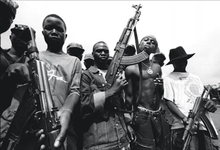This article provides insufficient context for those unfamiliar with the subject. (August 2020) |
| Second Liberian Civil War | |||||||
|---|---|---|---|---|---|---|---|
| Part of the Liberian Civil Wars and spillover of the Sierra Leone Civil War | |||||||
 Unidentified Liberian rebel fighters, including child soldiers, during the Second Liberian Civil War | |||||||
| |||||||
| Belligerents | |||||||
|
RDFG |
| ||||||
| Commanders and leaders | |||||||
|
|
| ||||||
| Strength | |||||||
|
11,000—14,000 (2002) 12,000 (2003)[3] 16,000 (2003)[3] |
(2003):[3] | ||||||
| Casualties and losses | |||||||
| ~50,000 killed[4] | |||||||
The Second Liberian Civil War was a civil war in the West African nation of Liberia that lasted from 1999 to 2003.
President Charles Taylor came to power in 1997 after victory in the First Liberian Civil War which led to two years of peace. The Liberians United for Reconciliation and Democracy (LURD), an anti-Taylor rebel group backed by the government of Guinea, invaded northern Liberia in April 1999. LURD made gradual gains against Taylor in the north and began approaching the capital Monrovia by early 2002. The Movement for Democracy in Liberia (MODEL), a second anti-Taylor rebel group, invaded southern Liberia in early 2003 and quickly conquered most of the south. Taylor, reduced to controlling only a third of Liberia and under pressure from the Siege of Monrovia, resigned in August 2003 and fled to Nigeria. The Accra Comprehensive Peace Agreement was signed by the warring parties a week later, marking the political end of the conflict and beginning Liberia's transition to democracy. The National Transitional Government led by interim President Gyude Bryant governed the country until the 2005 general election.
The Second Liberian Civil War resulted in the deaths of over 50,000 people and the internal displacement of thousands more. The conflict saw the widespread use of child soldiers by both Taylor and LURD. The United Nations Mission in Liberia was deployed in the country until it was officially withdrawn in 2018.
- ^ Kieh, George Klay (2009). "The roots of the second Liberian civil war". International Journal on World Peace. 26 (1): 7–30. JSTOR 20752871. Gale A197186608 ProQuest 219282049.
- ^ Africa South of the Sahara 2004. Europa Publications, Routledge. 2003. p. 608.
In October 2002 the ONU panel of Expert reported that some 1,250-1,500 former RUF combatants continued to operate in élite Liberian military units, under the command of Liberian General Benjamin Yeaten, but with continuing loyalty to Bockarie.
- ^ a b c Escola de Cultura de Pau. Liberia (inglés) pp. 3[dead link]
- ^ De re Militari: muertos en Guerras, Dictaduras y Genocidios